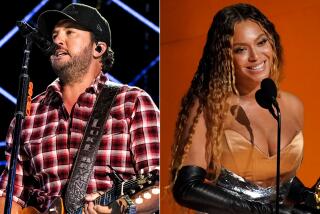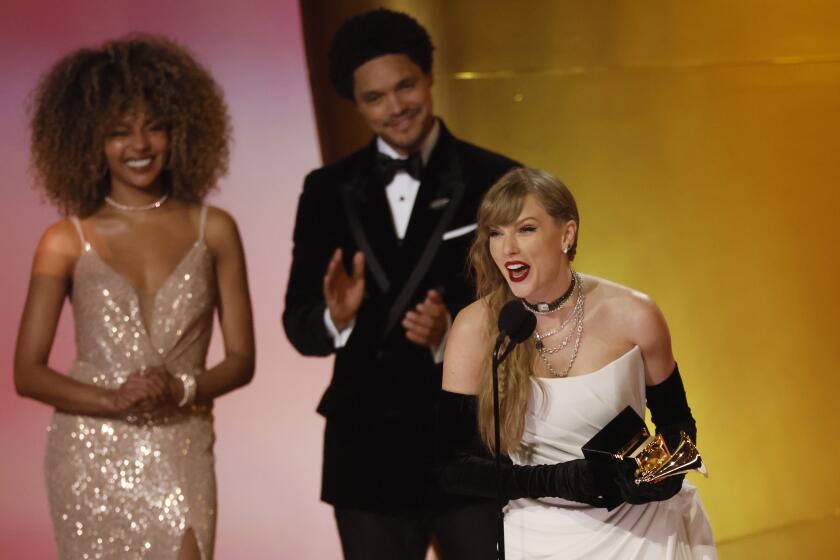Taking country out of the boonies
- Share via
It’s the NASCAR-ization of awards shows.
Watching last week’s Country Music Assn. awards on CBS, one couldn’t help but wonder if Nashville’s label heads had somehow stumbled onto a do-it-yourself guide issued by the stock-car racing circuit.
Only this manual doesn’t show how to break down a souped-up Chevy. Instead, it reveals the secrets for taking a form of entertainment that’s wildly popular in one region of the country and rolling it out nationwide. (Translation: Any organization that can make Tony Stewart better known today than Richard Petty was in his prime must be doing something right.)
Give the CMAs credit. The people behind the show at least put new thought into marketing an entire form of music that finds itself struggling to reignite sales.
Music awards are no longer must-see events, which means it may also be time for fresh thinking at the American Music Awards, which air Tuesday, and the Grammys, which arrive early next year.
Twenty years ago, the Grammys regularly averaged more than 30 million viewers, peaking at nearly 44 million in 1984 when Michael Jackson was still considered a hugely talented eccentric, nothing more.
These days, viewers don’t hesitate to shun music award shows for alternatives, which happened earlier this year to the Grammys, when it was creamed by “Desperate Housewives” in a head-to-head ratings battle.
Let’s not be too optimistic that anyone here is willing to think outside the boxed set. If there were a glut of forward thinkers in music, the industry wouldn’t have been steamrolled by illegal downloading, and music executives wouldn’t be nostalgic for the days when “Who Let the Dogs Out” topped the charts.
Country pulled out all the stops for the big city. In the week leading up to last Tuesday’s CMAs, the genre’s top acts were practically trying to sell their sounds door to door in New York, which doesn’t even have its own country radio station.
The city that doesn’t sleep couldn’t get in a waking hour without running into someone like Keith Urban, Kenny Chesney or Lee Ann Womack. Country stars appeared on every morning and late-night talk show that would have them, with concerts performed in such temples of sacred music as Carnegie Hall.
Even the slogan “Country Takes NYC” offered up images of red states invading a holdout blue state. Robert E. Lee may only have gotten as far north as Gettysburg, but darned if anyone was going to keep Rascal Flatts from storming Madison Square Garden.
Besides using New York as a home for this year’s awards, the show went out of its way to ease up on the Stetson factor.
The CMAs blended mainstream acts and celebrities with country stars, teaming Elton John and Dolly Parton, and pairing New Jersey’s Jon Bon Jovi with up-and-coming Atlanta band Sugarland.
Mayor Michael Bloomberg introduced Garth Brooks, who came out of semi-retirement to play live in Times Square. The best New York touch of the entire show may have been the endless traffic jam of yellow cabs trying to snake by Brooks as he performed. CBS censors no doubt appreciated that Brooks’ amplifiers were turned up high enough to drown out the cursing of the drivers.
But the whole “Country Takes Bite Out of the Big Apple” was too forced and calculated at times, underscoring the risk of trying too hard to keep your audience.
To give out the award for best female vocalist, singer LeAnn Rimes was joined by actor James Gandolfini, the New Jersey-bred New Yorker who plays a mobster on “The Sopranos.”
After bemoaning the fact that she hadn’t been nominated, Rimes told the audience Gandolfini had promised to take care of it next year. (Get it? He’s the guy on HBO with hit men.)
So, the show was hit and miss like virtually every other music awards program. Too often these affairs carry on for an agonizing three hours or more, with narcissistic celebrity winning out over good music.
Producers seem more content with generating a week’s worth of buzz via something like a calculating kiss between Madonna and Britney Spears than they do in giving fresh talent the break of a lifetime.
Did it work for the CMAs? As ratings go, results were decent, but not great. The show averaged 17.7 million viewers, down from 18.4 million a year earlier but better than the 16.6 million low in 2000.
As for the show’s push into the Big Apple, consider it a long-term investment.
About 30 years ago, the late Steve Goodman, an underappreciated Chicago folk singer, had a shtick in his act where he would piece together into one song all the required elements of a country ballad: stuff like mother, prison and trains.
But like NASCAR, country music long ago realized that its future lies beyond trains, prisons, mothers and Okies from Muskogee.
The rest of the music biz would do well to realize that a similar tuneup could go a long way when it comes to its other awards shows.
James Bates is deputy entertainment editor at the Los Angeles Times. He writes Behind the Screens as a regular column for the Envelope (theenvelope.latimes.com), a Times website devoted to Hollywood’s awards season. Send your ideas, comments, criticisms and tips to [email protected].
More to Read
The biggest entertainment stories
Get our big stories about Hollywood, film, television, music, arts, culture and more right in your inbox as soon as they publish.
You may occasionally receive promotional content from the Los Angeles Times.










